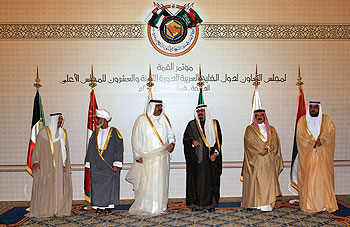
From Thom Shanker and Steven Lee Myers, the New York Times: With an eye on the threat of a belligerent Iran, the administration is also seeking to expand military ties with the six nations in the Gulf Cooperation Council — Saudi Arabia, Kuwait, Bahrain, Qatar, the United Arab Emirates and Oman. While the United States has close bilateral military relationships with each, the administration and the military are trying to foster a new “security architecture” for the Persian Gulf that would integrate air and naval patrols and missile defense. . . .
Officers at Central Command said that the post-Iraq era required them to seek more efficient ways to deploy forces and maximize cooperation with regional partners. One significant outcome of the coming cuts, officials said, could be a steep decrease in the number of intelligence analysts assigned to the region. At the same time, officers hope to expand security relationships in the region. [Central Command’s chief of staff, Maj. Gen. Karl R.] Horst said that training exercises were “a sign of commitment to presence, a sign of commitment of resources, and a sign of commitment in building partner capability and partner capacity.”
Col. John G. Worman, Central Command’s chief for exercises, noted a Persian Gulf milestone: For the first time, he said, the military of Iraq had been invited to participate in a regional exercise in Jordan next year, called Eager Lion 12, built around the threat of guerrilla warfare and terrorism.
Another part of the administration’s post-Iraq planning involves the Gulf Cooperation Council, dominated by Saudi Arabia. It has increasingly sought to exert its diplomatic and military influence in the region and beyond. Qatar and the United Arab Emirates, for example, sent combat aircraft to the Mediterranean as part of the NATO-led intervention in Libya, while Bahrain and the United Arab Emirates each have forces in Afghanistan.
At the same time, however, the council sent a mostly Saudi ground force into Bahrain to support that government’s suppression of demonstrations this year, despite international criticism.
Despite such concerns, the administration has proposed establishing a stronger, multilateral security alliance with the six nations and the United States. Mr. Panetta and Mrs. Clinton outlined the proposal in an unusual joint meeting with the council on the sidelines of the United Nations in New York last month.
The proposal still requires the approval of the council, whose leaders will meet again in December in the Saudi capital, Riyadh, and the kind of multilateral collaboration that the administration envisions must overcome rivalries among the six nations.
“It’s not going to be a NATO tomorrow,” said a senior administration official, who spoke on the condition of anonymity to discuss diplomatic negotiations still under way, “but the idea is to move to a more integrated effort.” (photo: PressTV Iran)
Image: presstv%20iran%2010%2030%2011%20GCC.jpg
